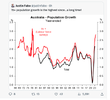- Joined
- 15 November 2006
- Posts
- 1,206
- Reactions
- 680
Because debt levels are far far higher now, then they were during previous cycles.As I was itting around waiting for todays RBA rates decision, I was idle looking at the RBA website.
This chart from the RBA highlights how from an histroric perspective, the rates of tay are nothing special in that they are still lower than at any time from 1990, and if the chart had more historical data, would go back even further would show that it is less than any valueof the cash rate as far back as 1969.
View attachment 162028
Not sure why we are all whinging about rates.
Mick
And because of the sudden and unexpected nature of the increase.




